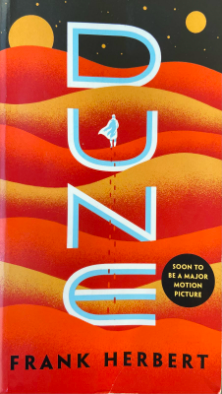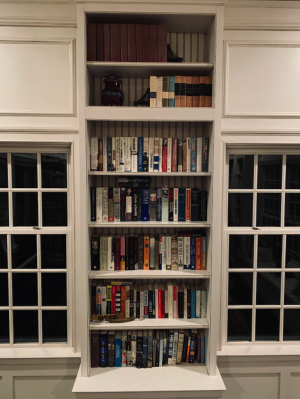Don’t miss out on the book: The sci-fi classic “Dune” explores modern themes of religious fanaticism, ecology

The sci-fi classic “Dune” explores religious and ecological themes ever-more relevant to modern day. Providing unique parallels to the oftentimes villainized middle-eastern culture, its alien story can give insight on misunderstood aspects of the modern world.
“I must not fear. Fear is the mind-killer. Fear is the little-death that brings total obliteration. I will face my fear. I will permit it to pass over me and through me. And when it has gone past I will turn the inner eye to see its path. Where the fear has gone there will be nothing. Only I will remain.” ~”Dune”
The highly anticipated “Dune” movie will be released on Oct. 1 this year, featuring a heavy-hitter cast and promising trailers. Timothee Chalamet, Zendaya and gigantic sand worms are all guaranteed to make for a great movie; however, I’d like to make the case that if there’s ever a time to read the book before watching the movie, this is it.
The “Dune” book is a certifiable sci-fi classic, having sold over 20 million copies since its release in 1965 with steady rise in commercial success. Nowadays, the book’s popularity is steadily maintained by cult followers who pass their battered 900-page monstrosities to any youth in sight, as well as the seemingly endless additions and expansions to the original universe.
Despite the book’s age, “Dune” tackles important contemporary themes, giving nuanced perspectives on the societies that fuel religious fanaticism as well as the generations-deep longing for ecological justice. I warn readers against watching the film adaptation first, spoiling the chance to explore this story in its original format.
“What do you despise? By this are you truly known.” ~”Dune”
“Dune” takes place in the distant future and follows the life of a Duke’s son, Paul, as their family begins to rule on the planet “Dune.” The planet is covered in endless desert, a foreign ecology that hosts fantastic beasts and exploratory intrigue. Among these are the giant sand worms that roam the deep desert, the ancient and ruthless native tribes and the mind-power inducing “spice” that the planet is mined for.
“Dune” is not just a fun story, however. Herbert explores taboo themes of religious violence and colonial exploitation, ideas which are prophetic to the US’s current presence in Middle Eastern countries. In an utterly original perspective, we follow a main character, Paul, who becomes a prophet to the natives, inspiring violence and religious fanaticism in an effort to free them from their oppressors.
Continuing the parallels, the widely sought-after “spice” drug is the reason for much suffering of the planet’s people as imperialists exploit them to maximize profits. In addition to this, many of the traditions and garbs of the natives harken to Islamic traditions.
Frank Herbert did indeed draw upon the vibrant culture of the Middle East, as well as its imperialist plight, for creative inspiration when writing “Dune.” In a funny way, Herbert’s passionate and empathetic exploration of this civilization, albeit fictional, can provide its reader their own unique perspective on a civilization widely villainized and stereotyped by modern western media.
In stretches of mind-bending prose, Herbert explores the tortured visions of the prophet Paul as he navigates the increasing reverence of his followers and the “terrible knowledge” of the jihad that’s to come. Discussed throughout the book is also the intersection of politics and religion, and the disastrous implications of a society totally convinced of their righteousness. These nuanced themes, portrayed throughout nearly 900 pages of the book, will be near impossible to adapt to film in a manner true to the source material.
“Without change something sleeps inside us, and seldom awakens. The sleeper must awaken.” ~”Dune”
Underlying and intertwined with the political and social tensions of “Dune” is the generations-long quest of the natives to transform the arid land. Early on in the story the reader is introduced to the lone planetary ecologist, Liet-Kynes, who dreams of an ecologically transformed planet, in which life could thrive and the natives needn’t starve for water.
The drug spice however, is produced solely in the desert, thus pitting the imperialists and the rest of the galaxy against this quest.
These themes can be paralleled with the environmental movement of today, and its opposition from fossil-fuel producers as well as large corporate polluters. Profit begets exploitation, Herbert seems to lament. And yet, the bone-deep longing of the natives, the reckless hope for a better planet cannot help but resound with readers.
“The mystery of life isn’t a problem to solve, but a reality to experience.” ~”Dune”
Despite its popularity and originality, “Dune” is plagued by many of the same issues one can typically observe in an older book. For one, the stilted and oftentimes needlessly complex dialogue may be a detractor from the reader’s enjoyment. I often found myself rereading pages as I tried to understand the elaborate metaphors and intellectual jests that the characters spoke to each other in.
At almost 900 pages in certain editions, the book is also quite lengthy, which can be either exhausting or exhilarating depending on the type of reader you are.
In spite of these flaws, “Dune” remains a truly unique, one-of-a-kind book. The kind of book that you breathlessly recommend to other readers, toil with when you can’t sleep and flip back through to relive your favorite moments. Ultimately, I rate “Dune” at an imperfect but no less wonderful four out of five.
“Dune” the movie, with its star studded cast and highly promising trailers, will be released in October 2021, so you’re on the clock before spoilers are inevitable. Before watching it, I highly recommend picking up a copy and reading the original prose. Take the opportunity to bury your nose in this fantastical future world where every passage is ripe with alien intrigue, and yet disturbingly familiar.


Creative Director, Maya Hruskar ’23, has had a passion for journalism since her freshman year. Not liking her traditional English class very much, Hruskar...





















































